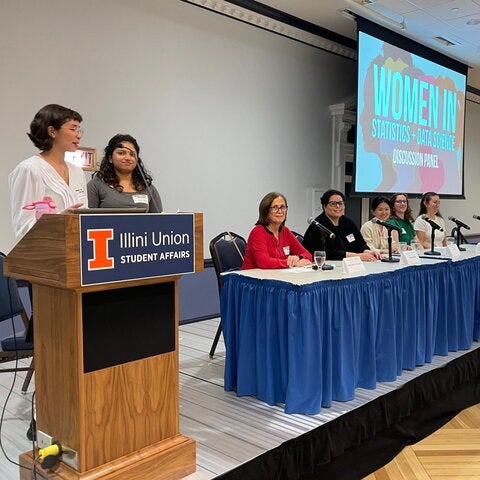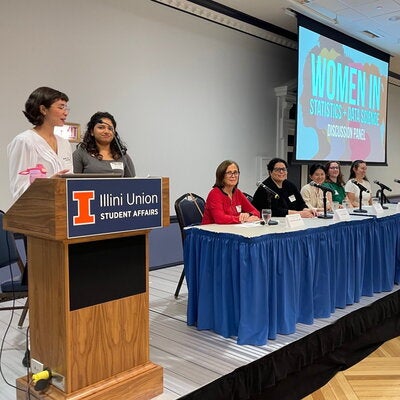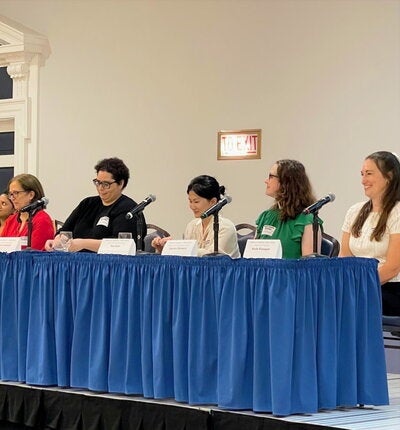

Illinois students gathered at the Illini Union on October 3 for the third annual Women in Statistics + Data Science panel. Organized by the Department of Statistics with support from the School of Information Sciences, the event invited panelists from across academia, research, and industry to share their stories and perspectives on being a woman in STEM.
Panelists included: Lelys Bravo de Guenni and Karle Flanagan of the University of Illinois Department of Statistics; Lauren Clement of the Financial Industry Regulatory Authority; Yue Guo, University of Illinois School of Information Sciences; and Nicole Jackson, Sandia National Laboratories.
Undergraduate students, Leah Issa Roco Decatus-Haddad (statistics) and Ganga Sajith (statistics), representing the Women in Statistics and Women in Data Science Urbana-Champaign student organizations, moderated the discussion through thoughtful questions.
Setting Goals in Pursuit of Success
Early in the discussion, the panelists discussed the evolving nature of goals and how success often requires flexibility. Clement shared that goals should be intentional but flexible. "Be realistic about your goals and theme them," she said, emphasizing that goals should lead you to the bigger picture. "Technical skills like coding are important, but soft skills like networking and getting involved are just as valuable." She added that setting boundaries and finding balance early on is just as crucial as establishing goals.
Guo encouraged attendees to view career changes as a natural part of growth. "It's good to have a big picture," she said. "But it's also okay to change your goals if you want to go a different direction." Every experience, she reminded the audience, contributes to development.
For many panelists, accomplishment came from the persistence of pursuing their goals. Bravo de Guenni emphasized that triumph can come from simply enjoying your work and maintaining the same passion that initially led you to it. "Change can be good, though," she said, reassuring the audience not to be afraid of necessary change.
Imposter syndrome was a shared experience for many of the panelists, each one sharing how it affected them and threatened to derail goals. The standard cure for imposter syndrome came down to confidence, and for Flanagan, it was about seeing each day as a victory. Flanagan shared that overcoming imposter syndrome early in her teaching career was just a matter of showing up each day. "When I was first hired, I was intimidated and had imposter syndrome. Getting through the day-to-day was a triumph worth celebrating and helped get through those feelings."
“Think about a problem and provide a solution to make a difference. Take the opportunities and just try.” — Lelys Bravo de Guenni, Department of Statistics
Finding Balance and Support
Work-life balance became a central theme throughout the discussion, with panelists sharing their thoughts on self-awareness and advocacy for well-being. Clement emphasized the importance of setting boundaries now and staying firm to your well-being. Clement urged students to use interview time to ask meaningful questions about the work culture to ensure it aligns with their wants and needs.
Jackson added a reminder that "No one is going to be mindful of your time other than yourself. Think about the things that matter to you and have the job revolve around that, not the other way around."
Flanagan also commented on respecting your own time and using the power of "No" for things you may not have the capacity for. She stressed that it might be scary at first, but being honest and prioritizing yourself is sometimes more important than pursuing your desires.
"Have expectations that there will be times you will be super busy and need to work more," Guo followed. Guo encouraged attendees to "explore the culture of employers" before committing to a job. "If your priorities and the workplace align, you will be happy. Otherwise, you will be miserable," she said.
Bravo de Guenni summed it up with advice passed down from a former mentor: "It's important to work hard, but it's also important to think hard." Ask yourself what you have done to make yourself feel better, and dedicate time to your well-being. Work hard, but schedule time for yourself too."

As the conversation shifted to finding and cultivating networks of support groups, the panelists shared their insights on seeking help and forming bonds. "People won't know to help if you don't ask," Guo remarked, reflecting on the support she has received from mentors and colleagues. "I want to support the next generation of researchers because I received a lot of support," she said.
Echoing that message of empowerment, Clement urged others to find peers and mentors to build a network of support. "Advocate for what you need," Clement said, noting that often when women assert themselves, they may face bias or backlash, but it is essential to stand firm for what they need.
Reflecting on her own experiences, Jackson remarked how empowering it was to see so many women in leadership roles at Sandia when she first started with the organization. "You don't necessarily see that all of the time," she said. "Culture-wise, because Sandia is so big and spread out, it brings in culture from all over the place." She recommended that audience members look for the resources and structures within the organization, as that will help identify what the company values.
Recalling that she was often one of the few women in her mathematics and statistics classes, Flanagan admitted that "It was sometimes intimidating." However, connecting with other women in STEM-based courses led Flanagan to long-time friendships. "I found some of my best friends over the fact that we were the only women in our classes," she said, emphasizing the importance of building a network of friends, mentors, and faculty for support.
Looking Ahead from the Past
As the conversation turned reflective, panelists offered heartfelt advice to their younger selves – and, by extension, to the students listening. Reinforcing an earlier point about making friends, Jackson encouraged students to hold on to meaningful relationships, but cautioned that not all will stand the test of time. "Cultivating friendships takes time and time is something you don't get back."
Guo reminded everyone to be kind to themselves with a warm and straightforward message to her younger self: "You did an excellent job. Be brave, dream big. Everything will be okay."
“You can do hard things — and those hard things deserve to be celebrated.”
— Karle Flanagan, Department of Statistics
When asked how to manage with imposter syndrome, Clement shared with attendees that such feelings are common, but not often talked about. Clement said it took meeting others in her organization who had similar feelings before realizing that she wasn't alone. She urged listeners to take that energy and channel it into confidence in their expertise. "Walk into that room knowing you are there to provide your expertise and your insights. You are there for a reason," she said.
Jackson echoed this, saying that "in that moment, you are the expert." However, Jackson reminded the audience that it is okay to be unsure when challenged. She encouraged everyone to surround themselves with people who complement their abilities and rely on them for support when needed.
Reflecting on this, Guo added that a mentor once shared the insight with her that when people ask questions about your project or interests, it is because they "want to learn more from you." She added that she often felt challenged when asked difficult questions she didn't have the answer to, but she realized it's okay to say, "I don't know."
Jackson echoed this statement. "Sometimes answering 'I don't know' is often viewed as a sign of weakness," she said. However, refuting that thought, she stated that "it is actually a sign of intelligence." Admitting you "don't know" something to yourself and the public is a difficult task that took her a long time to accept and become comfortable with.
Empowering the Next Generation
The evening concluded with a message of encouragement to the next generation of women in statistics and data science. The stories shared by the panelists reminded attendees that success in STEM is not a straight path, but one made through persistence, passion, and purpose.
Moderator Leah Issa Roco Decatus-Haddad reflected on the evening as a unifying experience. "Being in a safe space for women in statistics and data science was immensely validating," she said. "I felt that the panel's mission for solidarity was accomplished." Leah shared that participating in the event deepened her commitment to STEM and her leadership in the Women in Statistics club. "I hope attendees felt as validated and included as I did," she added, "and that hearing from these accomplished women inspires them to continue pursuing STEM education."
Co-moderator Ganga Sajith highlighted how the event showcased the range of paths within the field. "My biggest takeaway was seeing all the different pathways statistics and data science can lead to," she said. She reflected on her transition from attendee to co-host: "Last year, I found the panel inspiring. This year, I felt a sense of responsibility to guide the discussion and create that same experience for others." Ganga noted how powerful it was to see representation in the room: "Going from being one of a few women in my classes to being surrounded by peers and mentors who share my experience was so motivating."
